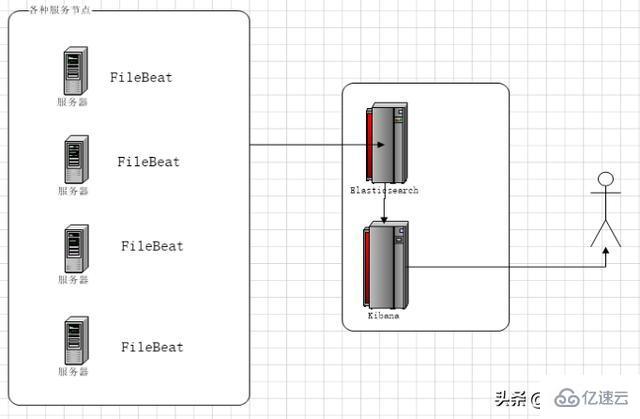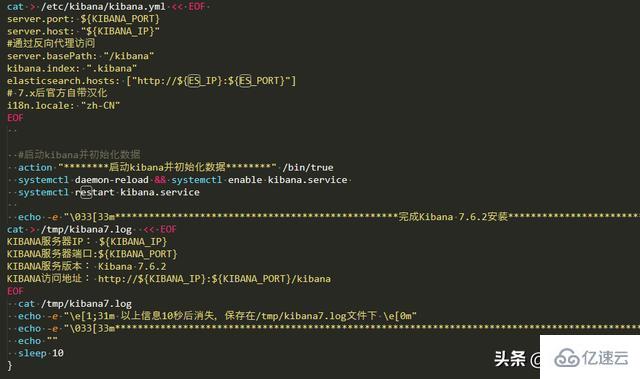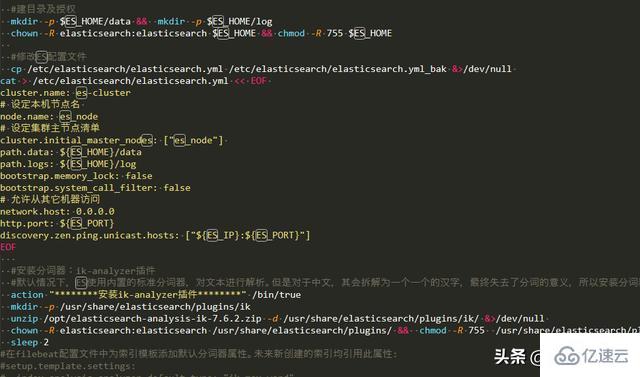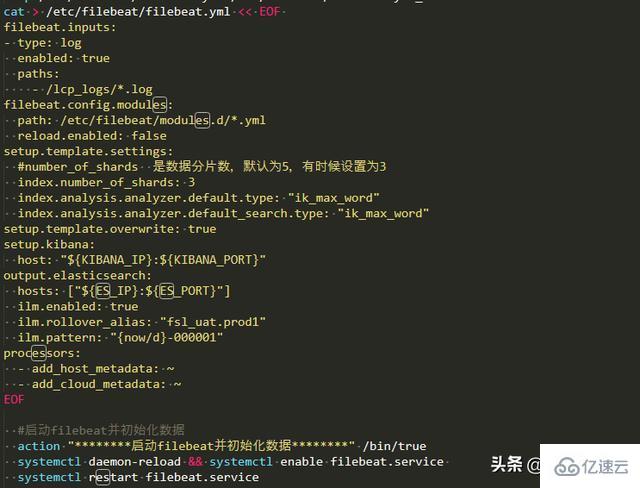这篇“Centos7下如何快速部署EFK服务”文章的知识点大部分人都不太理解,所以小编给大家总结了以下内容,内容详细,步骤清晰,具有一定的借鉴价值,希望大家阅读完这篇文章能有所收获,下面我们一起来看看这篇“Centos7下如何快速部署EFK服务”文章吧。
EFK是一套分布式日志服务解决方案,由各个组件构成。EFK分别是指:elasticsearch、filebeat、kibana。不过在真实的生产环境中,搭建日志服务可能还需要logstash来进行规制解析,使用kafka进行削峰填谷作为缓冲。

EFK采用集中式的日志管理架构
elasticsearch:一个开源分布式搜索引擎,提供搜集、分析、存储数据三大功能。它的特点有:分布式,零配置,自动发现,索引自动分片,索引副本机制,restful风格接口,多数据源,自动搜索负载等。
kibana:可以为Logstash 、Beats和ElasticSearch提供友好的日志分析Web 界面,可以帮助汇总、分析和搜索重要数据日志。
filebeat:轻量级日志采集器。需要在每个应用服务器配置filebeat,来采集日志,并输出到elasticsearch。

function install_es7_el7()
{
echo "" echo -e "\033[33m****************************************************安装ElasticSearch 7.6.2*****************************************************\033[0m"
#action "********初始化JAVA环境********" /bin/true #install_jdk #下载包 if [ -f /opt/elasticsearch-7.6.2-x86_64.rpm ] && [ -f /opt/elasticsearch-analysis-ik-7.6.2.zip ] ;then echo "*****存在ElasticSearch 7.6.2安装包,无需下载*****" else ping -c 4 artifacts.elastic.co >/dev/null 2>&1
if [ $? -eq 0 ];then wget https://artifacts.elastic.co/downloads/elasticsearch/elasticsearch-7.6.2-x86_64.rpm -O /opt/elasticsearch-7.6.2-x86_64.rpm
wget https://github.com/medcl/elasticsearch-analysis-ik/releases/download/v7.6.2/elasticsearch-analysis-ik-7.6.2.zip -O /opt/elasticsearch-analysis-ik-7.6.2.zip
else echo "please download ES7 package manual !" exit $?
fi
fi #安装es7.6 action "********安装ElasticSearch 7.6.2服务********" /bin/true chmod u+x /opt/elasticsearch-7.6.2-x86_64.rpm && rpm -ivh /opt/elasticsearch-7.6.2-x86_64.rpm
#建目录及授权 mkdir -p $ES_HOME/data && mkdir -p $ES_HOME/log chown -R elasticsearch:elasticsearch $ES_HOME && chmod -R 755 $ES_HOME
#修改ES配置文件 cp /etc/elasticsearch/elasticsearch.yml /etc/elasticsearch/elasticsearch.yml_bak &>/dev/null
cat > /etc/elasticsearch/elasticsearch.yml # 设定本机节点名 node.name: es_node # 设定集群主节点清单 cluster.initial_master_nodes: ["es_node"] path.data: ${ES_HOME}/data path.logs: ${ES_HOME}/log bootstrap.memory_lock: false bootstrap.system_call_filter: false # 允许从其它机器访问 network.host: 0.0.0.0 http.port: ${ES_PORT} discovery.zen.ping.unicast.hosts: ["${ES_IP}:${ES_PORT}"] EOF #安装分词器:ik-analyzer插件 #默认情况下,ES使用内置的标准分词器,对文本进行解析。但是对于中文,其会拆解为一个一个的汉字,最终失去了分词的意义,所以安装分词器:ik-analyzer插件 action "********安装ik-analyzer插件********" /bin/true mkdir -p /usr/share/elasticsearch/plugins/ik unzip /opt/elasticsearch-analysis-ik-7.6.2.zip -d /usr/share/elasticsearch/plugins/ik/ &>/dev/null
chown -R elasticsearch:elasticsearch /usr/share/elasticsearch/plugins/ && chmod -R 755 /usr/share/elasticsearch/plugins/
sleep 2#在filebeat配置文件中为索引模板添加默认分词器属性。未来新创建的索引均引用此属性:#setup.template.settings:# index.analysis.analyzer.default.type: "ik_max_word"# index.analysis.analyzer.default_search.type: "ik_max_word"#setup.template.overwrite: true#在Linux终端中执行如下命令,为现有所有索引,设置默认分词器属性:#curl -X POST "172.16.20.143:9200/_all/_close"#curl -X PUT -H'Content-Type: application/json' 'http://172.16.20.143:9200/_all/_settings?preserve_existing=true' -d '{# "index.analysis.analyzer.default.type" : "ik_max_word",# "index.analysis.analyzer.default_search.type" : "ik_max_word"#}'#curl -X POST "172.16.20.143:9200/_all/_open" #启动ES并初始化数据 action "********启动es并初始化数据********" /bin/true systemctl daemon-reload && systemctl enable elasticsearch.service
systemctl restart elasticsearch.service
es_version=`curl -XGET ${ES_IP}:${ES_PORT}`
echo -e "\033[33m**************************************************完成ElasticSearch 7.6.2安装***************************************************\033[0m"cat > /tmp/es7.log ${ES_IP}
ES服务器端口:${ES_PORT}ES数据目录: ${ES_HOME}/data
ES日志目录: ${ES_HOME}/logES详细信息: ${es_version}EOF
cat /tmp/es7.log
echo -e "\e[1;31m 以上信息10秒后消失,保存在/tmp/es7.log文件下 \e[0m" echo -e "\033[33m************************************************************************************************************************\033[0m" echo "" sleep 10
}
function install_es7_el7()
{
echo "" echo -e "\033[33m****************************************************安装ElasticSearch 7.6.2*****************************************************\033[0m"
#action "********初始化JAVA环境********" /bin/true #install_jdk #下载包 if [ -f /opt/elasticsearch-7.6.2-x86_64.rpm ] && [ -f /opt/elasticsearch-analysis-ik-7.6.2.zip ] ;then echo "*****存在ElasticSearch 7.6.2安装包,无需下载*****" else ping -c 4 artifacts.elastic.co >/dev/null 2>&1
if [ $? -eq 0 ];then wget https://artifacts.elastic.co/downloads/elasticsearch/elasticsearch-7.6.2-x86_64.rpm -O /opt/elasticsearch-7.6.2-x86_64.rpm
wget https://github.com/medcl/elasticsearch-analysis-ik/releases/download/v7.6.2/elasticsearch-analysis-ik-7.6.2.zip -O /opt/elasticsearch-analysis-ik-7.6.2.zip
else echo "please download ES7 package manual !" exit $?
fi
fi #安装es7.6 action "********安装ElasticSearch 7.6.2服务********" /bin/true chmod u+x /opt/elasticsearch-7.6.2-x86_64.rpm && rpm -ivh /opt/elasticsearch-7.6.2-x86_64.rpm
#建目录及授权 mkdir -p $ES_HOME/data && mkdir -p $ES_HOME/log chown -R elasticsearch:elasticsearch $ES_HOME && chmod -R 755 $ES_HOME
#修改ES配置文件 cp /etc/elasticsearch/elasticsearch.yml /etc/elasticsearch/elasticsearch.yml_bak &>/dev/null
cat > /etc/elasticsearch/elasticsearch.yml # 设定本机节点名 node.name: es_node # 设定集群主节点清单 cluster.initial_master_nodes: ["es_node"] path.data: ${ES_HOME}/data path.logs: ${ES_HOME}/log bootstrap.memory_lock: false bootstrap.system_call_filter: false # 允许从其它机器访问 network.host: 0.0.0.0 http.port: ${ES_PORT} discovery.zen.ping.unicast.hosts: ["${ES_IP}:${ES_PORT}"] EOF #安装分词器:ik-analyzer插件 #默认情况下,ES使用内置的标准分词器,对文本进行解析。但是对于中文,其会拆解为一个一个的汉字,最终失去了分词的意义,所以安装分词器:ik-analyzer插件 action "********安装ik-analyzer插件********" /bin/true mkdir -p /usr/share/elasticsearch/plugins/ik unzip /opt/elasticsearch-analysis-ik-7.6.2.zip -d /usr/share/elasticsearch/plugins/ik/ &>/dev/null
chown -R elasticsearch:elasticsearch /usr/share/elasticsearch/plugins/ && chmod -R 755 /usr/share/elasticsearch/plugins/
sleep 2#在filebeat配置文件中为索引模板添加默认分词器属性。未来新创建的索引均引用此属性:#setup.template.settings:# index.analysis.analyzer.default.type: "ik_max_word"# index.analysis.analyzer.default_search.type: "ik_max_word"#setup.template.overwrite: true#在Linux终端中执行如下命令,为现有所有索引,设置默认分词器属性:#curl -X POST "172.16.20.143:9200/_all/_close"#curl -X PUT -H'Content-Type: application/json' 'http://172.16.20.143:9200/_all/_settings?preserve_existing=true' -d '{# "index.analysis.analyzer.default.type" : "ik_max_word",# "index.analysis.analyzer.default_search.type" : "ik_max_word"#}'#curl -X POST "172.16.20.143:9200/_all/_open" #启动ES并初始化数据 action "********启动es并初始化数据********" /bin/true systemctl daemon-reload && systemctl enable elasticsearch.service
systemctl restart elasticsearch.service
es_version=`curl -XGET ${ES_IP}:${ES_PORT}`
echo -e "\033[33m**************************************************完成ElasticSearch 7.6.2安装***************************************************\033[0m"cat > /tmp/es7.log ${ES_IP}
ES服务器端口:${ES_PORT}ES数据目录: ${ES_HOME}/data
ES日志目录: ${ES_HOME}/logES详细信息: ${es_version}EOF
cat /tmp/es7.log
echo -e "\e[1;31m 以上信息10秒后消失,保存在/tmp/es7.log文件下 \e[0m" echo -e "\033[33m************************************************************************************************************************\033[0m" echo "" sleep 10
}
function install_filebeat7_el7()
{
echo "" echo -e "\033[33m****************************************************安装Filebeat 7.6.2*****************************************************\033[0m"
#下载包 if [ -f /opt/filebeat-7.6.2-x86_64.rpm ] ;then echo "*****存在Filebeat 7.6.2安装包,无需下载*****" else ping -c 4 artifacts.elastic.co >/dev/null 2>&1
if [ $? -eq 0 ];then wget https://artifacts.elastic.co/downloads/beats/filebeat/filebeat-7.6.2-x86_64.rpm -O /opt/filebeat-7.6.2-x86_64.rpm
else echo "please download Filebeat7.6 package manual !" exit $?
fi
fi #安装filebeat7.6 action "********安装filebeat 7.6.2服务********" /bin/true chmod u+x /opt/filebeat-7.6.2-x86_64.rpm && rpm -ivh /opt/filebeat-7.6.2-x86_64.rpm
#修改kibana配置文件 cp /etc/filebeat/filebeat.yml /etc/filebeat/filebeat.yml_bak
cat > /etc/filebeat/filebeat.yml type: log enabled: true paths: - /lcp_logs/*.log filebeat.config.modules: path: /etc/filebeat/modules.d/*.yml reload.enabled: false setup.template.settings: #number_of_shards 是数据分片数,默认为5,有时候设置为3 index.number_of_shards: 3 index.analysis.analyzer.default.type: "ik_max_word" index.analysis.analyzer.default_search.type: "ik_max_word" setup.template.overwrite: true setup.kibana: host: "${KIBANA_IP}:${KIBANA_PORT}" output.elasticsearch: hosts: ["${ES_IP}:${ES_PORT}"] ilm.enabled: true ilm.rollover_alias: "fsl_uat.prod1" ilm.pattern: "{now/d}-000001" processors: - add_host_metadata: ~ - add_cloud_metadata: ~ EOF #启动filebeat并初始化数据 action "********启动filebeat并初始化数据********" /bin/true systemctl daemon-reload && systemctl enable filebeat.service systemctl restart filebeat.service #nohup ./filebeat -e -c filebeat.yml >/dev/null 2>&1 &
echo -e "\033[33m**************************************************完成Filebeat 7.6.2安装***************************************************\033[0m"cat > /tmp/filebeat7.log ${KIBANA_IP}:${KIBANA_PORT}filebeat配置elasticsearch: ${ES_IP}:${ES_PORT}EOF
cat /tmp/filebeat7.log
echo -e "\e[1;31m 以上信息10秒后消失,保存在/tmp/filebeat7.log文件下 \e[0m" echo -e "\033[33m************************************************************************************************************************\033[0m" echo "" sleep 10
}
以上就是关于“Centos7下如何快速部署EFK服务”这篇文章的内容,相信大家都有了一定的了解,希望小编分享的内容对大家有帮助,若想了解更多相关的知识内容,请关注亿速云行业资讯频道。
免责声明:本站发布的内容(图片、视频和文字)以原创、转载和分享为主,文章观点不代表本网站立场,如果涉及侵权请联系站长邮箱:is@yisu.com进行举报,并提供相关证据,一经查实,将立刻删除涉嫌侵权内容。